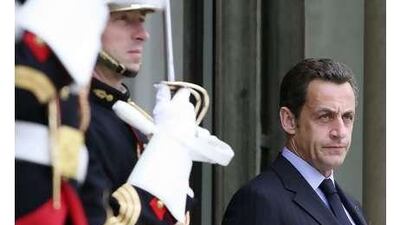PARIS // The charge list against Nicolas Sarkozy as one who loves to meddle in the media is long and has become longer now that the president is accused of wanting to replace the editor of Le Point, a weekly news magazine. Nouvel Observateur, a centre-left weekly magazine, alleges Mr Sarkozy asked Le Point's owner, François Pinault, "for the head of Franz-Olivier Giesbert". The magazine Mr Giesbert edits is insufficiently "Sarkozy-ist", the Nouvel Observateur reported, as it has run issues that apparently displeased the president.
Mr Pinault formally denies the story, while Mr Giesbert has said: "I am not worried," the Nouvel Observateur reported. True or not, the charge lands on a pile of alleged interventions, topped by the eviction of the news anchorman Patrick Poivre d'Avor, a household name for 20 years, from private television channel TF1. Known by his initials, PPDA was recently replaced at the 8pm news programme because, it was reported, he upset the president by referring to him as a "little boy" in an interview. PPDA's replacement is Laurence Ferrari, a journalist who is said to have impressed Mr Sarkozy when she interviewed him on the stump.
Mr Sarkozy has further stirred anxiety over media independence with his decision that the executive should appoint the head of France Television, which is a public station, taking that function away from the broadcast regulator, the Council for Audiovisual Supervision. The accusations of meddling made headlines, but came as no surprise. For Stéphane Rozès, director of CSA, a polling company, charges of interference feed the public's long-standing view that "the mainstream media depend on the political powers and financial powers".
If the public are big consumers of news, they are also critical of what they see as the media's close connections to political and economic elites, acting as an echo chamber for their interests rather than addressing the concerns of everyday life, Mr Rozès said. "The criticism and suspicion are quite old," he said. Opinion polls conducted in 1993 and 1994 showed that respondents saw politicians as no longer representing the general interest but attuned to their own economic interests.
For Marin Karmitz, chairman of MK2, an independent cinema chain and production company, and who sits on the committee reviewing financing for France Television, allegations of who fired whom distract from the real debate of how to ensure continued political and financial support for a public service broadcaster in need of sustainable funding. Mr Sarkozy surprised everyone in January, when he summarily announced that all advertising would cease on France Television by the end of the year. That left the government scrambling to find ways to plug a gap of ?700 million (Dh4 billion) when that amount in annual advertising revenue dries up.
Given the structural fall in advertising revenue caused by declines in viewing figures and fragmentation of audiences, Mr Sarkozy's putting an axe to advertising on France Television has forced urgent attention on how to fund the broadcaster. "In two years, revenue will be half what it is now," Mr Karmitz said. With the Council for Audiovisual Supervision in the grips of a political master, it is disingenuous to say the regulator appoints the France Television head, Mr Karmitz said. "We have to end that hypocrisy." Such are the network's problems, it was hard to find a top professional to take the job, which attracted mediocrities, he said. But if the president appoints, Mr Karmitz said, there is a direct link to the head of state, who must assume responsibility and support the broadcasting chief. Given the sensitivity, it would be difficult to name a conservative crony, he said.
One safeguard to executive appointment is approval by two-thirds of the National Assembly, the lower house of parliament. That is a real check, as a constitutional reform in July has boosted the assembly's effectiveness. As for PPDA's departure, Mr Karmitz is sceptical that the president was behind the move. "No one owns his job," he said. It was time for a change, given fallen audiences, he said.
The close ties between Mr Sarkozy and French media barons Arnaud Lagardere - whom the politician has called "my brother" - Vincent Bollore and Martin Bouygues, are not new. Mr Sarkozy's immediate predecessors as president, Jacques Chirac and François Mitterrand, also had personal connections with the owners, Mr Karmitz said. In that, public perception of the media's proximity to political power appears to be right.
Several years ago, France Television journalists compared their charter to the BBC's in an effort to find why the British organisation had editorial independence. The charters were similar. They concluded BBC journalists applied the spirit of their charter's principles. @Email:ptran@thenational.ae

